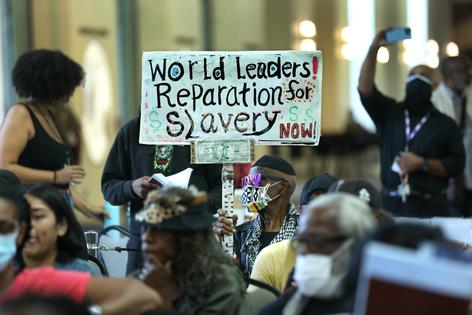Reparations over formerly enslaved people has a long history: 4 essential reads on why the idea remains unresolved
Published in Political News
The debate about reparations to descendants of enslaved people rages on.
In California, the state’s reparations task force has estimated that the descendants of former enslaved people living in California should receive a payment of $1.2 million per person.
While the issue of reparations is nothing new, California Governor Gavin Newsome created the task force in 2020 and called for it to offer solutions to the “structural racism and bias built into and permeating throughout our democratic and economic institutions.”
So far, Newsome has remained quiet on his task force’s recommendations and is awaiting its final report, expected on July 1, 2023.
Several scholars of U.S. slavery and the history of reparations have written articles explaining what the ongoing debate has been about since the idea first emerged after the Civil War. Here we spotlight four examples of those scholars’ work:
While researching his book “Making Whole What Has Been Smashed,” John Torpey learned that the idea of compensating freed slaves or their descendants has never really gained much traction in the United States.
A driving force behind the persistence of reparations talk is just how stark the racial differences remain, Torpey wrote.
Compared to whites, Torpey explained, “blacks tend to have lower educational attainment, rates of home ownership and life expectancy but higher rates of poverty, incarceration, unemployment and life-threatening diseases.”
As a result, the wealth gap between whites and Blacks remains very large, Torpey noted, “and wage inequality is likely making it worse.”
Read more:
Anne Bailey has researched slavery for the past three decades and has concluded that there are many rationales for reparations.
For one, Bailey wrote, “There has never been a leveling of the playing field, or payments for the debt of unpaid labor over 250 years of slavery.”
Furthermore, she explained, Black contribution to the wealth of America has not been acknowledged or given its due.
“Paying reparations to Americans of African descent could help the U.S. reclaim some moral leadership on the global stage,” Bailey wrote. “The U.S. is not the only country in the world with human rights abuses then or now, but it can be one of the few countries in the world that truly addresses these wrongs.”
In other words, Bailey concluded, the U.S. can lead by example.
Read more:
As a professor of public policy who has studied reparations, Thomas Craemer estimates the losses from unpaid wages and lost inheritances to Black descendants of the enslaved in America at around US$20 trillion in 2021 dollars.
“But what often gets forgotten by those who oppose reparations is that payouts for slavery have been made before,” Craemer wrote . “But those payments went to former slave owners and their descendants, not the enslaved or their legal heirs.”
A prominent example is the so-called “Haitian Independence Debt” that burdened an independent Haiti with reparation payments to former slave owners in France. Another was the British government, which paid reparations totaling the equivalent of about $429 billion in 2021 to slave owners when it abolished slavery in 1833.
In the U.S., President Abraham Lincoln signed into law the “Act for the Release of certain Persons held to Service or Labor within the District of Columbia” on April 16, 1862.
It gave former slave owners $300 per enslaved person set free.
The act also provided for an emigration incentive of $100 – around $2,683 in 2021 dollars – if the former enslaved person agreed to permanently leave the United States.
In contrast,“ Craemer wrote, "the formerly enslaved received nothing if they decided to stay in the United States.”
Read more:
As a professor of political science who studies the relationship between democracy, citizenship and justice, Bernd Reiter has examined how Germany dealt with the horrors of the Holocaust.
Instead of seeking to erase the Holocaust from its history, the German government has paid since the end of World War II the equivalent of $7 billion for Israel and $1 billion for the World Jewish Congress, an international federation of Jewish communities and organizations.
“The German government has worked hard to ensure remembrance, penance, recompense and justice,” Reiter wrote. “The United States, in contrast, has no official policy of atoning for slavery.”
Read more:
Editor’s note: This story is a roundup of articles from The Conversation’s archives.
This article is republished from The Conversation, an independent nonprofit news site dedicated to sharing ideas from academic experts. The Conversation has a variety of fascinating free newsletters.
Read more:
Slavery reparations: there’s little legal basis to make companies pay for historic actions
What the US can learn from Africa about slavery reparations


























































Comments